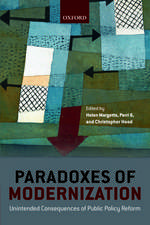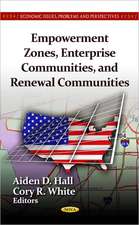Reversals of Fortune: Public Policy and Private Interests
Autor Gary Mucciaronien Limba Engleză Paperback – dec 1994
In this book, Gary Mucciaroni examines the shifting fortunes of economic interest groups in Washington. He addresses such compelling questions as: Why do policymakers bestow benefits on these groups in some areas of public policy but refrain from doing so in others? Why are benefits given to these industries in one period but revoked at a later time? What conditions and processes shape policymakers' postures toward particular interests, and why do they sometimes change?
Mucciaroni compares and contrasts four policy areas—tax incentives, anti-competitive regulations, trade barriers, and agricultural subsidies—where it is possible for interest groups to gain substantial benefits while paying little of the costs. He finds that the fortunes of these groups vary considerably across policies and over time.
In explaining these patterns, Mucciaroni argues that interest group fortunes are not shaped so much by the interest groups themselves or their political activities, but rather by what he calls the "issue and institutional contexts." The kinds of issues that become salient, how they are defined in policy debates, and the different institutional arrangements for making policy choices all have a powerful impact on group fortunes. The comparative case study approach allows the author to build generalizations about the relationship between issues, institutions, interests, and policy without sacrificing the rich and nuanced insights found in single case studies.
Mucciaroni compares and contrasts four policy areas—tax incentives, anti-competitive regulations, trade barriers, and agricultural subsidies—where it is possible for interest groups to gain substantial benefits while paying little of the costs. He finds that the fortunes of these groups vary considerably across policies and over time.
In explaining these patterns, Mucciaroni argues that interest group fortunes are not shaped so much by the interest groups themselves or their political activities, but rather by what he calls the "issue and institutional contexts." The kinds of issues that become salient, how they are defined in policy debates, and the different institutional arrangements for making policy choices all have a powerful impact on group fortunes. The comparative case study approach allows the author to build generalizations about the relationship between issues, institutions, interests, and policy without sacrificing the rich and nuanced insights found in single case studies.
Preț: 198.51 lei
Nou
Puncte Express: 298
Preț estimativ în valută:
37.98€ • 39.66$ • 31.44£
37.98€ • 39.66$ • 31.44£
Carte tipărită la comandă
Livrare economică 04-18 aprilie
Preluare comenzi: 021 569.72.76
Specificații
ISBN-13: 9780815758754
ISBN-10: 0815758758
Pagini: 242
Dimensiuni: 152 x 229 x 17 mm
Greutate: 0.33 kg
Ediția:New.
Editura: Brookings Institution Press
Colecția Brookings Institution Press
Locul publicării:United States
ISBN-10: 0815758758
Pagini: 242
Dimensiuni: 152 x 229 x 17 mm
Greutate: 0.33 kg
Ediția:New.
Editura: Brookings Institution Press
Colecția Brookings Institution Press
Locul publicării:United States
Notă biografică
Gary Mucciaroni is associate professor of political science at Temple University. He is a former research fellow of the Brookings Institution and the author of The Political Failure of Employment Policy: 1945-1982 (University of Pittsbur
Descriere
In this book, Gary Mucciaroni examines the shifting fortunes of economic interest groups in Washington. He addresses such compelling questions as: Why do policymakers bestow benefits on these groups in some areas of public policy but refrain from doing so in others? Why are benefits given to these industries in one period but revoked at a later time? What conditions and processes shape policymakers' postures toward particular interests, and why do they sometimes change?
Mucciaroni compares and contrasts four policy areas—tax incentives, anti-competitive regulations, trade barriers, and agricultural subsidies—where it is possible for interest groups to gain substantial benefits while paying little of the costs. He finds that the fortunes of these groups vary considerably across policies and over time.
In explaining these patterns, Mucciaroni argues that interest group fortunes are not shaped so much by the interest groups themselves or their political activities, but rather by what he calls the "issue and institutional contexts." The kinds of issues that become salient, how they are defined in policy debates, and the different institutional arrangements for making policy choices all have a powerful impact on group fortunes. The comparative case study approach allows the author to build generalizations about the relationship between issues, institutions, interests, and policy without sacrificing the rich and nuanced insights found in single case studies.
Mucciaroni compares and contrasts four policy areas—tax incentives, anti-competitive regulations, trade barriers, and agricultural subsidies—where it is possible for interest groups to gain substantial benefits while paying little of the costs. He finds that the fortunes of these groups vary considerably across policies and over time.
In explaining these patterns, Mucciaroni argues that interest group fortunes are not shaped so much by the interest groups themselves or their political activities, but rather by what he calls the "issue and institutional contexts." The kinds of issues that become salient, how they are defined in policy debates, and the different institutional arrangements for making policy choices all have a powerful impact on group fortunes. The comparative case study approach allows the author to build generalizations about the relationship between issues, institutions, interests, and policy without sacrificing the rich and nuanced insights found in single case studies.
















